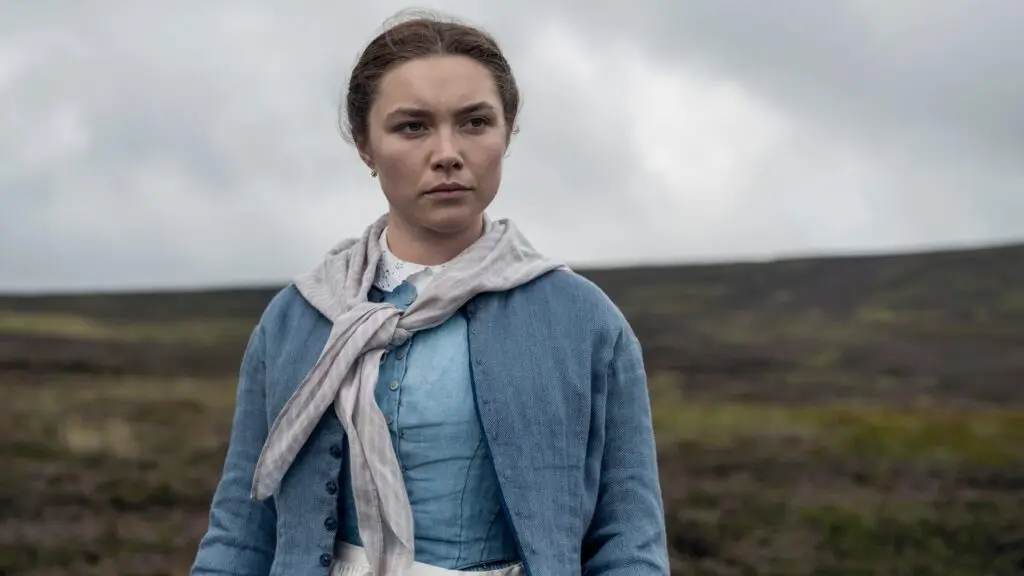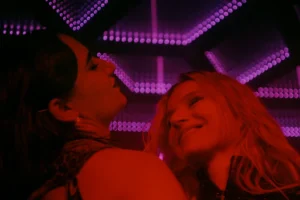The Wonder is set in the 1800s, and a wartime English nurse is sent to a poor village in Ireland to watch and observe a child for two weeks. Why? The child, Anna (played by Kila Lord Cassidy), has not eaten for four months per the deeply religious community’s leadership. Lib Wright (Florence Pugh), the medical professional assigned to the observation, doesn’t believe a word of it.
The town is divided, but considering the deeply held beliefs of such religious figures and local physicians (which include Ciaran Hinds and Toby Jones), we need to find out if they have a miracle on their hands.
Along the way, Lib meets an equally skeptical reporter from London, William Byrne (Tom Burke), who was originally from this small town. His family killed themselves by starvation, nailing themselves into their home so they could not leave.
Lib, who has seen so much tragedy and bloodshed in her own life by being a nurse in wartime England, feels attracted to him, but even more so when they share a deeply felt trauma.
We know that Anna has claimed not to have eaten for four months. Her parents are not leaving her side, even if they are being watched by local priests, nuns, and doctors. Logically, Lib thinks it is somehow the mother slipping her food.
The nurse then calls for no contact from her family, even though the parents are shocked, they would deny “a mother’s kiss is sacred” to their child. Anna and her family often talk about “Mana from Heaven,” which seems like nothing until Lib discovers they are clues to unlocking the mystery.
“Mana from Heaven” is a gift from God. A “mother’s sacred kiss” is actually Anna’s mom giving her food as birds do with their children — she slips her daughter chewed-up food from her mouth to keep her alive for four months. Anna is doing this because of the prayer she recites. If she does this enough times, her brother’s soul will be released from Hell.
Anna lives with the torment and pain of knowing her brother is burning in hell, and instead of fasting for one day, the more she skips her meals, the greater the chance he will be saved.
But why would Anna think that? Even though her brother was only a child like her, Anna alludes to the fact that her brother told her they had “double love” and married at night when she was only nine years old. Her brother then got sick. He later died, and Anna’s mother blamed her for his death. “It wasn’t holy, and he was being punished,” Anna tells Lib.
Is Lib able to save Anna’s life? The nurse asks Byrne to meet Lib at the well with Anna to help save the poor girl’s life. Lib carries her there and feeds her. Lib then runs to the home, pours gasoline all over Anna’s room, and sets it ablaze.
Fire catches on her arms and dress. She runs out and tries to snuff out the flames. She is found by the Nun, Sister Ryan, later, and Lib tells the board what happened. Her explanation is that she must have knocked over a lamp in her frantic attempts to save Anna.
Nobody is found, and they cannot punish a nurse who was being paid to be a servant, so they just withhold her pay. Later, Sister Ryan says she envisioned a man carrying Anna by horse to a better place.
And she asks Lib if she is alright.
The film ends with Lib meeting William in Dublin, and they take a family photo. They change their names to avoid being caught with the child and travel to, I would assume, England, but the book has them going to Australia.
Anna’s new name is Nan Burns. There, Lib gets Anna to eat healthily. The camera then pans out to a woman dressed in modern clothes, quietly chanting, “In. Out. In. Out.”
We believe the woman chanting is Niam Algar, who is playing herself in this scene. She played Kitty in the film. She said her character breaks down the fourth wall for the audience.
Repeating the same words repeatedly, as she does, could be viewed as echolalia. This is something that can cause anxiety, irritability, or frustration in those who hear it, in this case, the audience.




